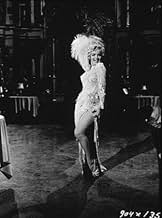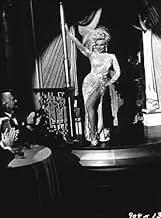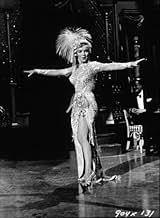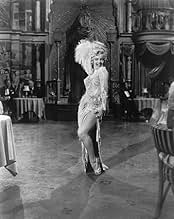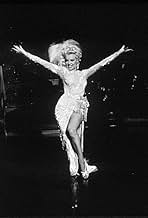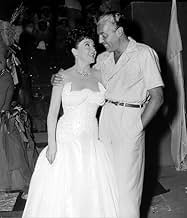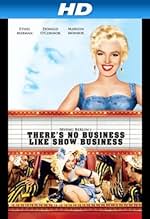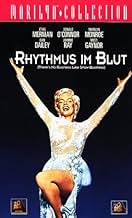IMDb-BEWERTUNG
6,4/10
7113
IHRE BEWERTUNG
Füge eine Handlung in deiner Sprache hinzuA blonde beauty upsets a show business family.A blonde beauty upsets a show business family.A blonde beauty upsets a show business family.
- Regie
- Drehbuch
- Hauptbesetzung
- Für 3 Oscars nominiert
- 4 Nominierungen insgesamt
Dorothy Abbott
- Showgirl
- (Nicht genannt)
Dorothy Adams
- Nurse
- (Nicht genannt)
Robert Adler
- Night Watchman
- (Nicht genannt)
Aladdin
- Orchestra Violinist
- (Nicht genannt)
Fred Aldrich
- Private Detective
- (Nicht genannt)
Empfohlene Bewertungen
"There's No Business Like Show Business" was never intended to be great film-making or storytelling, so please do not watch it with those things in mind.
Sure, it was over-staged, over-produced, in some cases over-acted and any other "overs" you can think of, but it's just fun to relax and watch and listen to. I've seen the film maybe dozens of times (I own the DVD) and it's obvious to me that despite a few on screen gaffes and off-screen problems for at least a couple of the actors, Hollywood had a whale of a good time making it. Some of the characters are unrealistic and I'm sure if you could ask the actors, all would say it was by far not their best work.
Furthermore, if we didn't know it before, "Show Business" proved that Johnnie Ray, the part crooner, part rock belter of the era, couldn't act his way into or out of a paper bag. But so what?? This ain't Hamlet. Ray was cast to do here what he did best: sing the heck out of a couple of songs that were arranged precisely to suit his performing style. And he also just managed to pull off an unusual plot twist that I'm sure audiences of the era did not expect.
We're all asked to suspend temporarily all logic and reason when we turn on our TVs or go to the movies. Why stop with "There's No Business Like Show Business"? So grab the munchies, sit back and let Ethel Merman and Gang entertain you for a couple of harmless, gaudy hours.
Sure, it was over-staged, over-produced, in some cases over-acted and any other "overs" you can think of, but it's just fun to relax and watch and listen to. I've seen the film maybe dozens of times (I own the DVD) and it's obvious to me that despite a few on screen gaffes and off-screen problems for at least a couple of the actors, Hollywood had a whale of a good time making it. Some of the characters are unrealistic and I'm sure if you could ask the actors, all would say it was by far not their best work.
Furthermore, if we didn't know it before, "Show Business" proved that Johnnie Ray, the part crooner, part rock belter of the era, couldn't act his way into or out of a paper bag. But so what?? This ain't Hamlet. Ray was cast to do here what he did best: sing the heck out of a couple of songs that were arranged precisely to suit his performing style. And he also just managed to pull off an unusual plot twist that I'm sure audiences of the era did not expect.
We're all asked to suspend temporarily all logic and reason when we turn on our TVs or go to the movies. Why stop with "There's No Business Like Show Business"? So grab the munchies, sit back and let Ethel Merman and Gang entertain you for a couple of harmless, gaudy hours.
Contrary to what a lot of people seem to think of this film, my biggest complaint with it is Marilyn Monroe. The studio shoehorned her into this film in their attempt to make the biggest musical extravaganza ever, and she just doesn't fit. She's so out of sync with the other characters that she might as well be from a different planet.
Don't get me wrong. I'm not a huge Marilyn fan, but she was good (and well-cast) in "Some Like It Hot". She's just all wrong for "No Business Like Show Business", and she looks and sounds ridiculous.
To be fair, Johnnie Ray often doesn't hold up well before modern audiences, either, when he sings. It's not that he's bad; it's that his style has come and gone and hardly been seen since. Everything in this movie tends to be at least a little overdone, and asking Johnnie Ray to exaggerate his singing does not produce flattering results.
Still, Donald O'Connor and Mitzi Gaynor are as brilliant and exuberant as you could hope. Ethel Merman is, well, Ethel Merman, and exactly right for her part. Dan Dailey is like a reliable locomotive that never disappoints.
The story is a bit plodding at times, but it only exists to set up one gala musical number after another. It only really bogs down when it gets caught up with Marilyn's character. If the studio had just left Marilyn out of it, perhaps giving Mitzi Gaynor the love interest role, and toned down the general effort level just a hair, this would've been one of the all-time greats.
It's still absolutely worth seeing -- in widescreen format, if you possibly can.
Don't get me wrong. I'm not a huge Marilyn fan, but she was good (and well-cast) in "Some Like It Hot". She's just all wrong for "No Business Like Show Business", and she looks and sounds ridiculous.
To be fair, Johnnie Ray often doesn't hold up well before modern audiences, either, when he sings. It's not that he's bad; it's that his style has come and gone and hardly been seen since. Everything in this movie tends to be at least a little overdone, and asking Johnnie Ray to exaggerate his singing does not produce flattering results.
Still, Donald O'Connor and Mitzi Gaynor are as brilliant and exuberant as you could hope. Ethel Merman is, well, Ethel Merman, and exactly right for her part. Dan Dailey is like a reliable locomotive that never disappoints.
The story is a bit plodding at times, but it only exists to set up one gala musical number after another. It only really bogs down when it gets caught up with Marilyn's character. If the studio had just left Marilyn out of it, perhaps giving Mitzi Gaynor the love interest role, and toned down the general effort level just a hair, this would've been one of the all-time greats.
It's still absolutely worth seeing -- in widescreen format, if you possibly can.
This CinemaScope musical follows the lives and loves of the Donahues, a family of vaudeville performers: father Terrance (Dan Dailey), mother Molly (Ethel Merman), elder son Tim (Donald O'Connor), daughter Katy (Mitzi Gaynor), and younger son Steve (Johnnie Ray). They persevere through changing tastes, the stock market crash, and the start of WW2. Tim falls for co-star Vicky (Marilyn Monroe), while Katy finds romance with writer Charles (Hugh O'Brian), and Steve pursues a different calling.
The threadbare story merely serves to connect a series of elaborate musical numbers designed to make the best of the new widescreen CinemaScope format. Director Lang and choreographer Robert Alton turn in some excellent work, and Donald O'Connor reportedly called this his favorite of his films (over Singin' in the Rain?!?). I watched this for Monroe, who doesn't impress much here. She supposedly didn't want to appear in this, but did so in order to win the lead in The Seven Year Itch. This was one of Fox's most expensive productions to date, and despite selling a lot of tickets, it ended up being a money-loser. It earned Oscar nominations for (inexplicably) Best Story (Lamar Trotti), Best Score (Alfred & Lionel Newman), and Best Color Costumes (Charles Le Maire, Miles White, Travilla).
The threadbare story merely serves to connect a series of elaborate musical numbers designed to make the best of the new widescreen CinemaScope format. Director Lang and choreographer Robert Alton turn in some excellent work, and Donald O'Connor reportedly called this his favorite of his films (over Singin' in the Rain?!?). I watched this for Monroe, who doesn't impress much here. She supposedly didn't want to appear in this, but did so in order to win the lead in The Seven Year Itch. This was one of Fox's most expensive productions to date, and despite selling a lot of tickets, it ended up being a money-loser. It earned Oscar nominations for (inexplicably) Best Story (Lamar Trotti), Best Score (Alfred & Lionel Newman), and Best Color Costumes (Charles Le Maire, Miles White, Travilla).
The first time you watch this movie, you'll think it's long, boring, and stupid. The second time you watch this movie, you'll love it. I can't begin to tell you why, but it's the truth. (I had the chance to show this film to an audience during a Donald O'Connor film festival. People came up to me weeks later to say that they had caught it again on cable, and loved it the second time through.)
Marilyn is definately "ehh". This movie was filmed during her worst years of personal abuses, and it shows all over her face and her work, lending a shadowy sadness to her character for modern audiences. Donald O'Connor's character also takes on a new depth for modern viewers familiar with his own life's history, oftentimes with a sharp poignance that helps him grab control of so many scenes, and turn his character's story into the strongest sub-plot of the film.
Merman is BRILLIANT as the real head of this family, giving us a wonderfully unique character. Her role as the strong, smart, powerful, and loving mother is truly a standout for the 50's in general, and musicals in particular.
Marilyn is definately "ehh". This movie was filmed during her worst years of personal abuses, and it shows all over her face and her work, lending a shadowy sadness to her character for modern audiences. Donald O'Connor's character also takes on a new depth for modern viewers familiar with his own life's history, oftentimes with a sharp poignance that helps him grab control of so many scenes, and turn his character's story into the strongest sub-plot of the film.
Merman is BRILLIANT as the real head of this family, giving us a wonderfully unique character. Her role as the strong, smart, powerful, and loving mother is truly a standout for the 50's in general, and musicals in particular.
When Darryl F. Zanuck virtually forced exhibitors and most of his fellow studio mogul rivals to adopt CinemaScope as a panacea for TV's devastation of Hollywood's weekly box office bonanza, he dictated that virtually all of Twentieth's output was to be filmed in that eye-stretching process. "There's No Business Like Show Business," directed by that old pro, Walter Lang, seems to be the prime example of Darryl's minions saying to their boss: "You want wide? We'll give you W-I-D-E!!"
Everything about it was designed and lensed to emphasize the original ratio of the CinemaScope process and viewing it on a video that isn't letterboxed must look like what a one-eyed person must experience in everyday life. I never did see it in a theater but I have seen it on a TV broadcast which more-or-less recreated its widescreen ratio. It's a glorious mish-mash. Every Berlin tune that could be stuffed into it is given at least one run-through; John de Cuir's production design must have occupied every inch of several of Twentieth's West Los Angeles soundstages; Ethel Merman, after her terrific movie repeat of her Broadway success in "Call Me Madam" for Fox (and now, as of 2005, available on video), trumpets away in number after number (Must have been an ear-rending experience over those original four-track stereophonic sound systems.); Dan Dailey, Donald O'Connor and Mitzi Gaynor give it their energetic best; and then there's Marilyn. What can we say, with all that so sadly, in her personal life, came after she reluctantly fulfilled her contractual obligation in this one? She dazzles in, let's face it, a rather vulgar way, and seems shoehorned in to boost the potential box office. And they even added Johnnie Ray, a huge jukebox success at the time (and, due to his hearing deficiency, performing his songs at an even greater volume than La Merman.)
All in all this one shouldn't be missed if you want to view an example of Hollywood at its brassiest, in a production fairly bulging with elements that may not coalesce very harmoniously but which was, no doubt, worth the price of admission to those movie palaces before they were carved up to become the precursors of today's sterile multiplexes.
Everything about it was designed and lensed to emphasize the original ratio of the CinemaScope process and viewing it on a video that isn't letterboxed must look like what a one-eyed person must experience in everyday life. I never did see it in a theater but I have seen it on a TV broadcast which more-or-less recreated its widescreen ratio. It's a glorious mish-mash. Every Berlin tune that could be stuffed into it is given at least one run-through; John de Cuir's production design must have occupied every inch of several of Twentieth's West Los Angeles soundstages; Ethel Merman, after her terrific movie repeat of her Broadway success in "Call Me Madam" for Fox (and now, as of 2005, available on video), trumpets away in number after number (Must have been an ear-rending experience over those original four-track stereophonic sound systems.); Dan Dailey, Donald O'Connor and Mitzi Gaynor give it their energetic best; and then there's Marilyn. What can we say, with all that so sadly, in her personal life, came after she reluctantly fulfilled her contractual obligation in this one? She dazzles in, let's face it, a rather vulgar way, and seems shoehorned in to boost the potential box office. And they even added Johnnie Ray, a huge jukebox success at the time (and, due to his hearing deficiency, performing his songs at an even greater volume than La Merman.)
All in all this one shouldn't be missed if you want to view an example of Hollywood at its brassiest, in a production fairly bulging with elements that may not coalesce very harmoniously but which was, no doubt, worth the price of admission to those movie palaces before they were carved up to become the precursors of today's sterile multiplexes.
Wusstest du schon
- WissenswertesOne day, Marilyn Monroe's husband, Joe DiMaggio, visited the set. He refused to be photographed with Monroe, but insisted on being photographed with Ethel Merman, whom he called "my favorite star."
- PatzerDonald O'Connor wears a gold ring on his left ring finger in almost all of his scenes. The ring is missing when he performs "A Man Chases a Girl (Until She Catches Him)", in the scene with Marilyn Monroe just before that, and in the film's climactic scenes.
Rings are not permanent fixtures, he simply removed the ring at some point and chose to no longer wear it.
- Zitate
Molly Donahue: "Don't worry." Hmm. That's a laugh. You start worrying about your kids the day they're born and you never stop. Even after they bury you, I bet you never stop.
- VerbindungenFeatured in Die Welt der Marilyn Monroe (1963)
- SoundtracksWhen the Midnight Choo-Choo Leaves for Alabam'
(uncredited)
Written by Irving Berlin
Performed by Ethel Merman and Dan Dailey
Later performed by Mitzi Gaynor and Donald O'Connor
Top-Auswahl
Melde dich zum Bewerten an und greife auf die Watchlist für personalisierte Empfehlungen zu.
- How long is There's No Business Like Show Business?Powered by Alexa
Details
- Erscheinungsdatum
- Herkunftsland
- Sprachen
- Auch bekannt als
- El mundo de la fantasía
- Drehorte
- Produktionsfirma
- Weitere beteiligte Unternehmen bei IMDbPro anzeigen
Box Office
- Weltweiter Bruttoertrag
- 6.341 $
- Laufzeit
- 1 Std. 57 Min.(117 min)
- Seitenverhältnis
- 2.55 : 1
Zu dieser Seite beitragen
Bearbeitung vorschlagen oder fehlenden Inhalt hinzufügen



